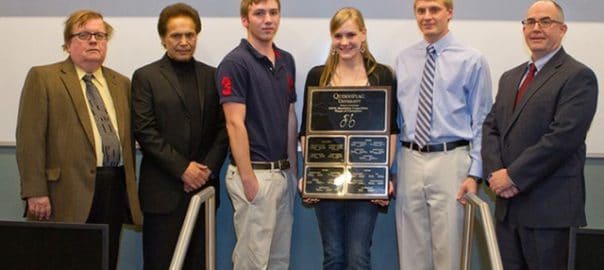In today’s society, internet access is becoming increasingly available in many mediums ranging from SmartPhones, Personal Computers, iPads, and Laptops; and as a result, technology adoption rates are increasing rapidly throughout the world. Consequently, many education providers, who we would classify as ‘innovators and early adopters’, are beginning to see a shift in their cultural views towards teaching, coaching and mentoring to a culture in which traditional methods of education are beginning to become outdated. Traditional methods still have their place, but as an article from article from EducationBusinessUK.net suggests few people would assert that a teacher standing in front of a class is the only effective way of helping learn1. As such, there is an increasing trend in Tertiary Education providers moving away from traditional classrooms in favour of an integrated approach using electronic education tools such as Online Lectures, iTunesU, Gaming and Simulations. There are many advocates for gaming/simulation, some of which are Michael Gove, the British Secretary of State for Education, who has previously stated “Games and interactive software can help pupils acquire complicated skills and rigorous knowledge in an engaging and enjoyable way.”2
Universities around the world are using the most recent technology to provide their students/users with a whole new learning experience. Khan Academy, a massive not-for-profit online education provider, runs courses and lectures ranging from subjects about computer programming basics to art history. In 2011 Khan Academy reported having approximately 39 million page views and 3.5 million unique users per month3. Apple has also ‘jumped on the e-learning bandwagon’ with their iTunes U app, which gives students and professors a new space to experience university by giving access to university courses, lab demonstrations, sports highlights, campus tours and special lectures from highly regarded universities from around the world4. In February 2013, Apple announced that iTunes U had over one billion downloads. In addition to these, we see many of Universities modifying their courses to utilise the genesis of business simulations5.
Business Simulations have proven to provide an engaging interface where instructors are given the opportunity to work alongside their students’ and foster their understanding of fundamental business concepts. Smartsims business simulations encourage students to engage in their learning by giving them control of their own simulated business experience. As a result, students often find themselves immersed in the simulation, applying key concepts of business and strategy as they manage their own simulated organisation. According to a recent article written by Kineo.com6, e-learning boasts several benefits for both students and instructors:
- With traditional methods of education, students are often limited to predetermined hours of in-class engagement. However, with the advent of online education systems this is no longer the case. Online education and business simulations are not bound by geography or time, therefore allowing users to have the full flexibility to further their learning in an engaging manner outside of the classroom or lecture hall. This leaves normal contact time between students and instructor for engrossing discussions or learning new theories and concepts.
- Depending on how a business simulation or electronic learning system is integrated into a course, information can benefit from faster delivery cycle times than traditional education methods. Often is the case with classroom style education, information dissemination is often restricted to the availability of classrooms and instructors.
Kineo’s article also cites an article written by Fletcher and Tobias, published in the journal ‘Training and Retraining’ in 2000, commissioned by the American Psychological Society, to state the benefits online education can have on the learning process; “Learners learn more using computer-based instruction than they do with conventional ways of teaching, as measured by higher post-treatment test scores”7. Business Simulations allow students to truly engage in their learning process by applying the business concepts they have learnt in class to a simulated business environment. The biggest advantage of a business simulation is that students learn by doing.
Overall, technology has presented some challenges to the education system which many tertiary education providers and third parties have attempted to take on. Consequently, e-learning has presented many opportunities for students and instructors alike. The only question remains, where will technology lead us to next?
– Brook McFarlane









